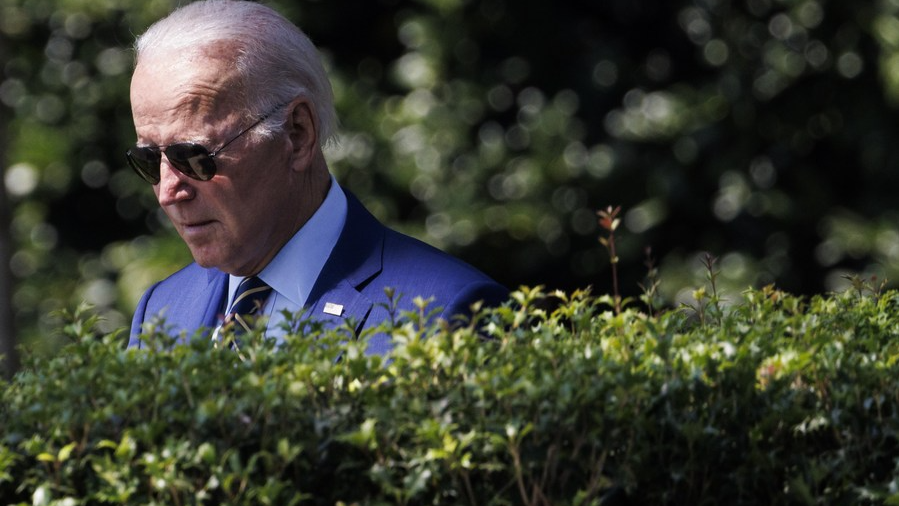
U.S. President Joe Biden walks on the South Lawn to board Marine One at the White House in Washington, D.C., U.S., July 20, 2022. [Photo/Xinhua]
By Xin Ping
"The pandemic is over," President Joe Biden declared in an interview with CBS last month. Citing widespread optimism in the country, Biden said, "If you notice, no one's wearing masks. Everybody seems to be in pretty good shape."
But the hard truth is there for all to see. The United States has reported more than 96 million COVID-19 cases and over one million related deaths so far. Both numbers remain the highest in the world. Ashish Jha, the White House COVID-19 response coordinator, said in a briefing that according to the Centers for Disease Control and Prevention (CDC), around 70 percent of Americans have contracted COVID-19.
Life has never been more fragile in decades in this modern country with all its advanced medical services. Life expectancy in the U.S. plunged in the last two years, a CDC report showed. A 0.9-year drop in life expectancy in 2021, along with a 1.8-year fall in 2020, marked the sharpest two-year decline in nearly a century. The virus has become the third-leading cause of death in the U.S. after heart disease and cancer.
When victims are reduced to numbers, it may be easily forgotten that behind every number are individual human beings. They are much more than just numbers on the paper. It is barely fathomable that the people in one of the wealthiest countries in the world would have to constantly live through tragedy in their everyday life, mourning lost lives and struggling in broken families.
The plight of "COVID orphans" has become an urgent issue for the federal and state governments. In only one month in 2021, 37,300 children under 17 had lost at least one parent due to the virus. In total, more than 200,000 Americans under 18 have lost at least one parent to the pandemic. As of May 2022, more than 250,000 American children have lost a primary or secondary custodian due to the pandemic. And roughly 85 percent of people who died from COVID-19 through mid-August this summer were 65 or older.
The pandemic has also disproportionately impacted minorities. "COVID-19 was not only a national tragedy, but also a failure of social justice. The burden of disease – in terms of deaths, illness, and economic costs – was borne disproportionately by the poor, women, and people of color. "The poor were America's essential workers, on the front lines, saving lives and also incurring disease and death," said Jeffrey Sachs, an economist and Columbia University Professor.
Native Americans have been hit particularly hard, because they are more likely to face other social and economic problems besides disease, such as poverty, discrimination, and poor access to quality health care. Their life expectancy fell by 4.5 years in 2020 alone from 2019, and in 2021 fell by 6.4 years to 65.2 years, the national average in 1944.
Even for the majority of ordinary Americans, life has got a lot harder because of the pandemic. Reports of people contracting and re-contracting COVID-19 and experiencing sequelae in one way or another have pointed to the long-term physical fallout from coronavirus infection, known as "long COVID." Victims may experience physical and mental health problems of different types and combinations of symptoms lingering over different lengths of time, including malaise, fatigue, breathing challenges, cardiovascular abnormalities, migraines, depression and anxiety, among other conditions.
Just on the second day of Biden's interview, protesters occupied the pavement outside the White House to demand a better deal for people affected by long COVID. "We are not in 'pretty good shape', and we will not forget that President Biden is throwing us away with his denial of the pandemic," a protester said.
"This is an indication of a society in decline," said Perry N. Halkitis, dean of the Rutgers School of Public Health. "We continue to have structural inequalities and social conditions that fuel disease in people. Unless you address those, people will get sick and die."
Xin Ping is a commentator on international affairs who writes regularly for CGTN, Xinhua, and Global Times.

 中文
中文



